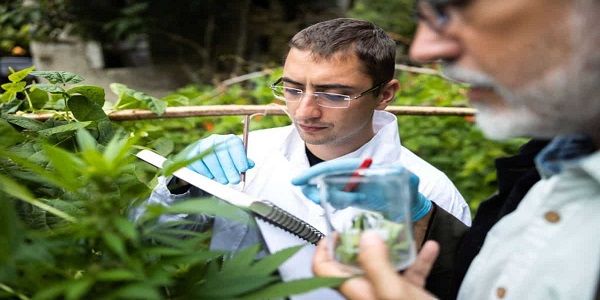List Of Career Opportunities In Plant Science And Biotechnology In Nigeria – Are you interested in a career in the field of plant science and biotechnology? There are lots of interesting jobs for those willing to pursue careers in plant science and biotechnology.
Jobs in plant science and biotechnology can give rewarding career paths for people with an interest in the natural world. Plant science contributes to medicine, agriculture, food science, and many other fields. If you’re interested in pursuing a career in plant science and biotechnology, this article will be useful to you.
List Of Career Opportunities In Plant Science And Biotechnology In Nigeria
- Landscape designer
- Agronomist
- Soil Scientist
- Professor
- Plant Breeder/Geneticist
- Crop Consultant
- Chemist
- Floral Designer
- Entomologist
- Biotechnologist
- Biologist
- Agricultural Rural Development Specialist
- Plant Pathologist
- Horticulturist
- Environmental scientist
- Toxicologist
- Rural Development Specialist
- Plant Engineer
- Science Writer
- Science Teacher
- Weed Scientist
- Forester
- Landscape technician
Top Career Opportunities In Plant Science And Biotechnology In Nigeria
- Agronomist
- Crop Consultant
- Horticulturist
- Toxicologist
- Biotechnologist
- Soil Scientist
- Entomologist
- Environmental scientist
- Rural Development Specialist
- Landscape Technician
1. Agronomist
This is the family doctor of plants. It is diverse with a commitment to weed management, plant physiology, crop rotation, irrigation and drainage, soil classification and soil fertility, or insect and pest control. Agronomists aim to lift more efficient farming and growth practices that give growers more ability to maximize production.
An agronomist has to manage soil management, control, and crop management, which are the major areas in the production and growth of food. Agronomists also study plants, soil, seeds, and products to get more insight into the needs of different types of crops.
Moreover, agronomists are called the go-between for farmers and crop researchers. They are concerned with the health and well-being of crops utilize for food production, land reclamation, and fuel. They study circumstances and use the result to assist prescribed solutions to farmers. Agronomists give information and guidance to farmers relating to new scientific developments to help the growing operation.
2. Crop Consultant
Crop consultants can also be called crop advisors. They provide advice on crop management, providing recommendations on seed planting, pest management, fertilization, and treatment for diseases that can improve plant growth. They can work with growers nationwide to assist them to improve plant production. Crop consultants require deep knowledge of pest management, microclimates, irrigation, growing patterns, botany, and soil science.
Graduates of Plan Science and Biotechnology can work as a professional in this field. Crop consultants are specialists in providing advice to farmers about the types of crops to plant on a specific type of land. They work closely with their clients about budgets, soil, seeds, and other environmental conditions, including humidity, rainfall, and humidity, Crop consultants also proffer solutions to pests, crop diseases, and other issues that may damage a farmer’s crops.
3. Horticulturist
Horticulturists provide maintenance, cultivation, and propagation of plants. They can distinguish between types of plants, identify pests and diseases, evaluate the conditions of soil, take care of a healthy environment for plants to thrive, and so on.
Horticulturists are responsible for cultivating, harvesting, planting, pruning, and feeding plants to assist them to grow. People in this profession may work for a garden center, arboretum, or another related facility that has a lot of plants that need constant care. They can also diagnose diseases in plants and recommend treatment plans.
Horticulturists relate to the art, science, technology, and business of cultivating vegetables, herbs, fruits, nuts, seeds, sprouts, mushrooms, flowers, and so on.
4. Toxicologist
Toxicologists, who work in the field of biomedical science, are delegated the duty of testing samples to check the presence of different chemicals and toxins. They may test human or animal samples, including tissue and bodily fluids, or test plant life to know the impact of varieties of chemicals used to manage weeds and other growth. Toxicologists use scientific techniques to research the presence of toxins and evaluate the harmful effects and risks associated with them.
They are specialists who draw from biology, chemistry, and medicine to research the impacts of chemicals on living organisms. Toxicologists also study the harmful effects of chemical, biological, and physical agents in biological systems
5. Biotechnologist
The duties of a biotechnologist entail creating and improving products and impact for agriculture, medicine, and conservation making use of biological organisms. They develop new medicines and vaccinations. Biotechnology conducts cross-breeding of plants and animals to bring out desired attributes. They utilize bacteria in areas including food production and waste; provide the answers to climate change, diseases, fuel alternatives, and food security.
A biologist studies plant life and living organisms to know their habitats, behaviors, composition, and interaction with their environment. They do experiments on these organisms and report on the findings, obtain measurements, and samples, and interpret data to give information about the relationships between living organisms. Biotechnologists may work in varieties of fields, such as agriculture, education, food science, medicine, and consumer goods.
6. Soil Scientist
Being one of the best courses in plant science and biotechnology, they study all aspects of the earth consisting of soil formation, classification, and mapping; biological, physical, chemical, and fertility properties; and how they relate to the use and effective management of soils
A soil scientist has to research and study soil attributes and use their findings to check the proper use capabilities of soil in various areas of the world. Soil scientists can also map different soil types and research the responses of those soil types to management practices to check what grows best in each type. They may give consultation services on urban or rural land use based on their findings.
Specialists in this field can work as soil scientists to carry out fieldwork, consisting of the gathering of soil samples from different environments to present maps of soil types and their distribution.
Soil scientists are also involved in supervising laboratory research by conducting laboratory analyses of soil samples and research experiments. They also complete paperwork tasks and catalog findings, keeping up to date with effectiveness in soil science, and environmental issues as well as legislative changes that may affect clients’ work.
7. Entomologist
The bug expert also called entomologist studies how to prevent crops from pest attacks. They develop positive ways of Integrated Pest Management, by using predatory insects to control others
The duties of people in this profession are to study the behavior, lifecycle, classification, ecology, physiology, and population-related of insects. They also study insects that reside in forests and depend on other animals to eat or live in urban areas. Some entomologists specialize in how to make effectively control pests through research and the study of patterns as well as habits.
8. Environmental scientist
This profession entails protecting human health and the environment through the study and education in natural science. Environmental scientists give details about the dangers and effects the ecosystem may suffer from different chemicals to the public. They also clean up polluted areas, give tangible information to policymakers, and advise industries to reduce waste.
Moreover, they are responsible for managing and protecting the environment from harmful substances. Environmental scientists collect and gather data from water, air, food, and soil samples, assess the samples to know environmental threats and impacts, and develop plans to manage those threats. They also give their findings to government agencies and private organizations.
9. Rural Development Specialist
Rural development specialists oversee the development, implementation, and monitoring of the project’s work plan and related rural development works, conducting the application of the market systems development approach. They work closely with local communities to create consensus on investment projects and assist bring these to fruition. They also work with the market and rural development teams to achieve target goals related to rural development.
10. Landscape Technician
They are responsible for ensuring the safety of the landscaping of a property, such as growing and maintaining the plants, flowers, and trees that grow in a particular area. Landscape technicians maintain and install sprinkler systems and related irrigation systems, create new growth patterns depending on seasonal changes, use the necessary feeding system and water schedules of plants, and develop walkways throughout the landscaping. Landscape technicians can also have some other tasks, such as mowing, weeding, and fertilizing.
Conclusion
Choosing a career in plant science and biotechnology is a good decision because it pays well. You will also be able to learn new things in the process of carrying out your tasks. This will be the end of the article “list of career opportunities in plant science and biotechnology in Nigeria”. Choose the one that you can master well.
Frequently Asked Question(s)
Where can a plant scientist and biotechnologist work in Nigeria?
There are many places in Nigeria that you can work with Plant Science degree. These places include banks, manufacturing companies, schools, universities, health care institutions, research firms, government agencies etc.
How much is Biotech salary in Nigeria?
Biotechnology salary depends on where you work, different employees have different salary packages. Private employees pay more than government but not in all cases. The salary range for Biotechnology graduates in Nigeria is between 60,000 naira to 400,000 naira per month.
Can Biotechnologists work in hospitals?
Qualified graduates can complete M.Sc in Medical Biotechnology and work in research institutes all over the world as Research Associate or Research Scientists. They can also become medical professionals in clinical settings, hospitals, and pharmaceutical companies.
How many years is Biotechnology in Nigeria?
4 years
Is Biotechnology useful in Nigeria?
Nigeria and other developing countries have problems of food shortage, global warming, erosion, desertification, health and poverty. These problems require immediate solutions that can be provided by Biotechnology.
Reference(s)
- studentsmirror.com – Career Opportunities in Plant Science and Biotechnology
- croplife.com – TOP 10 JOBS IN PLANT SCIENCE
- indeed.com – 15 Jobs in Plant Science (Plus Duties and Salaries)






